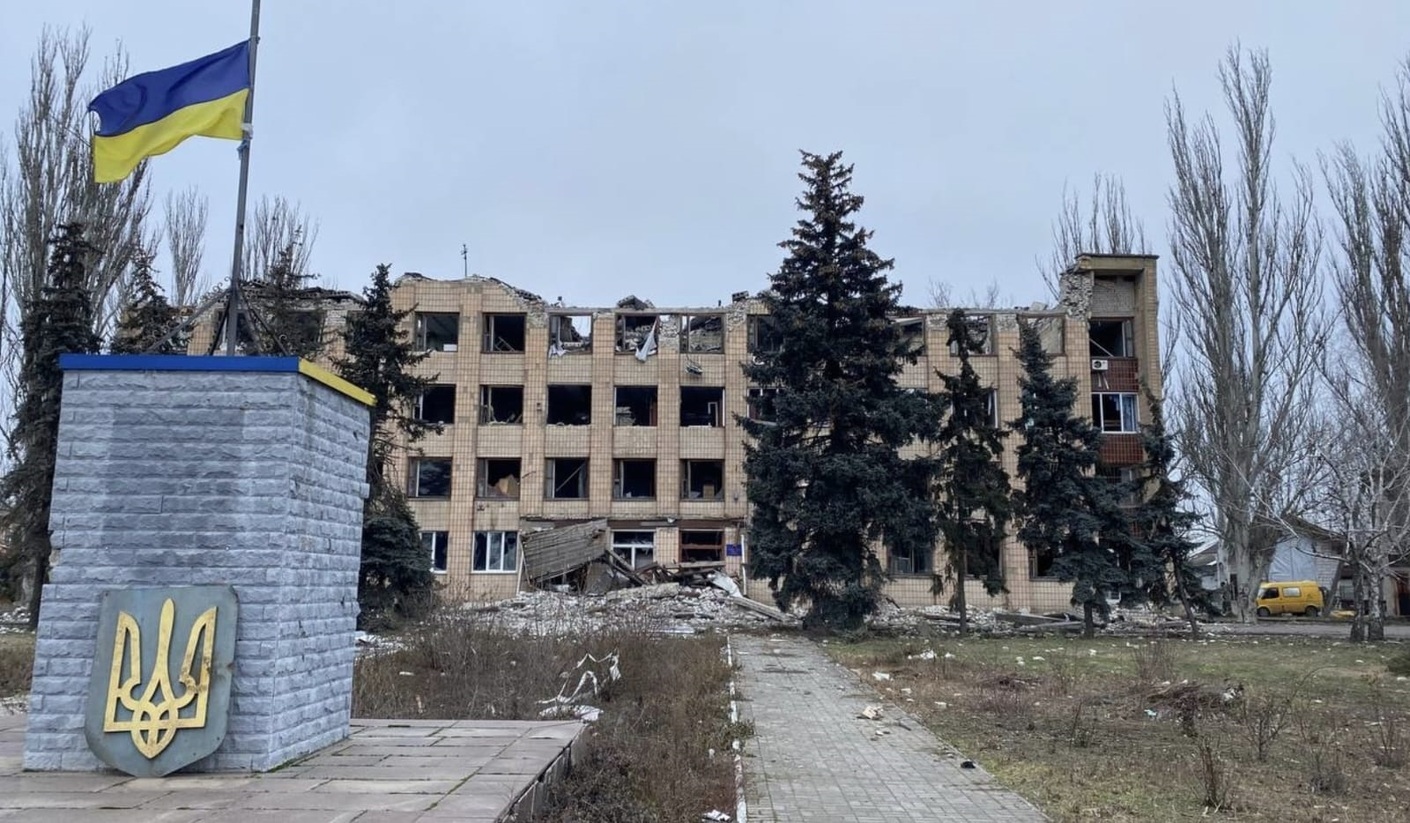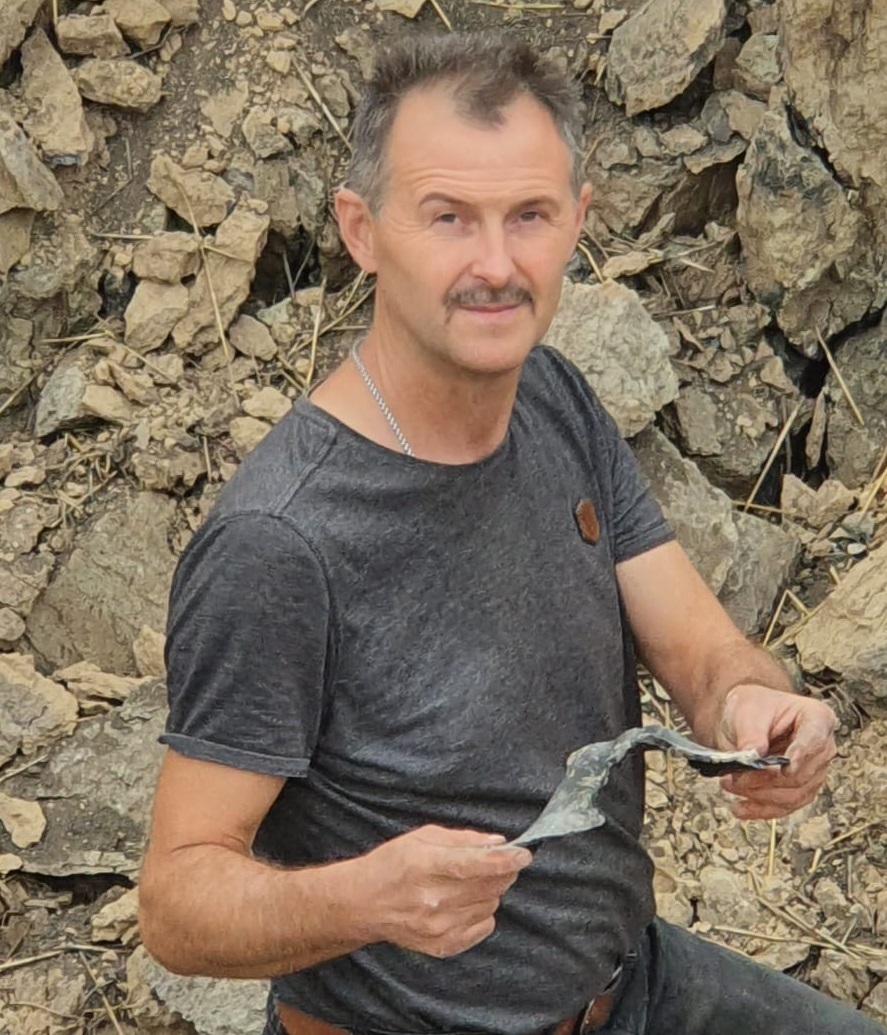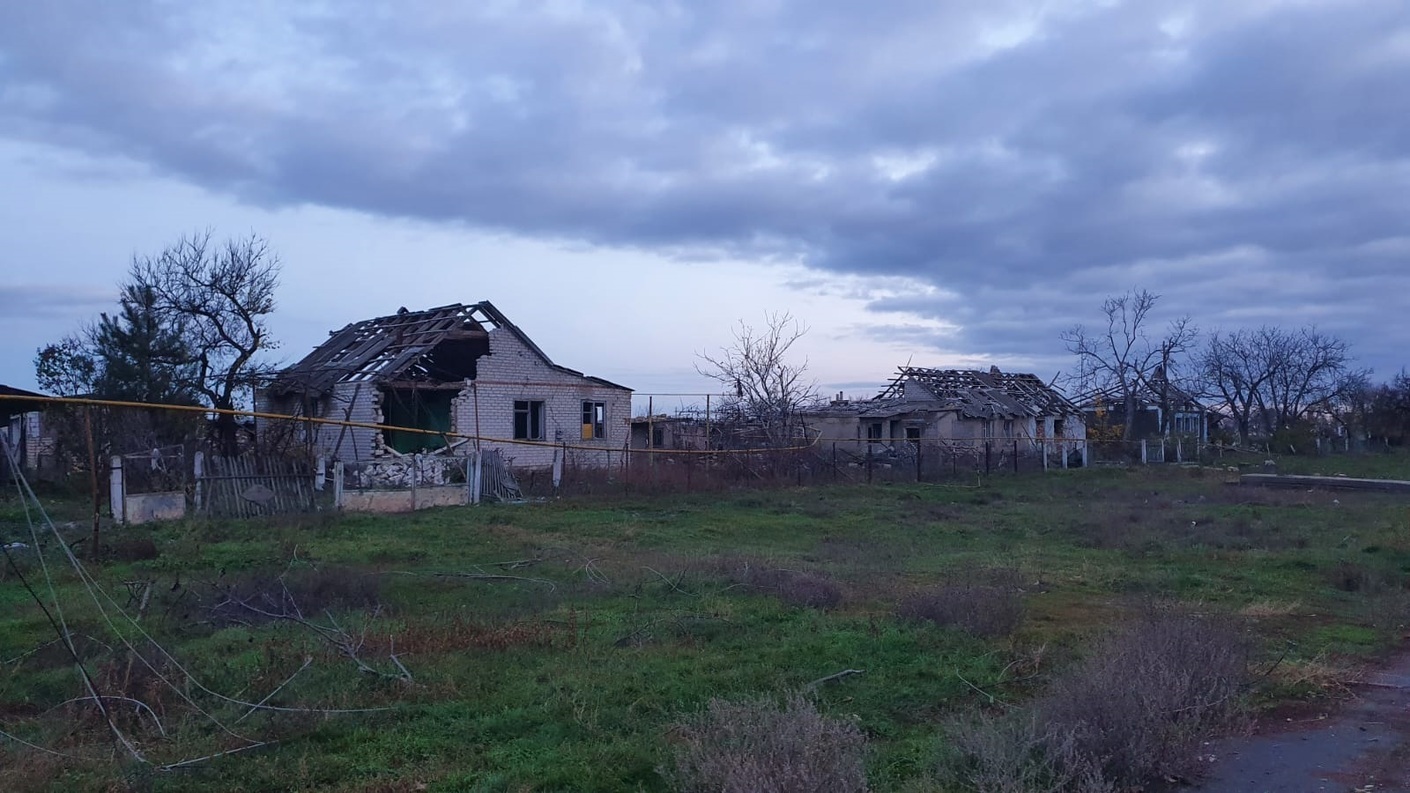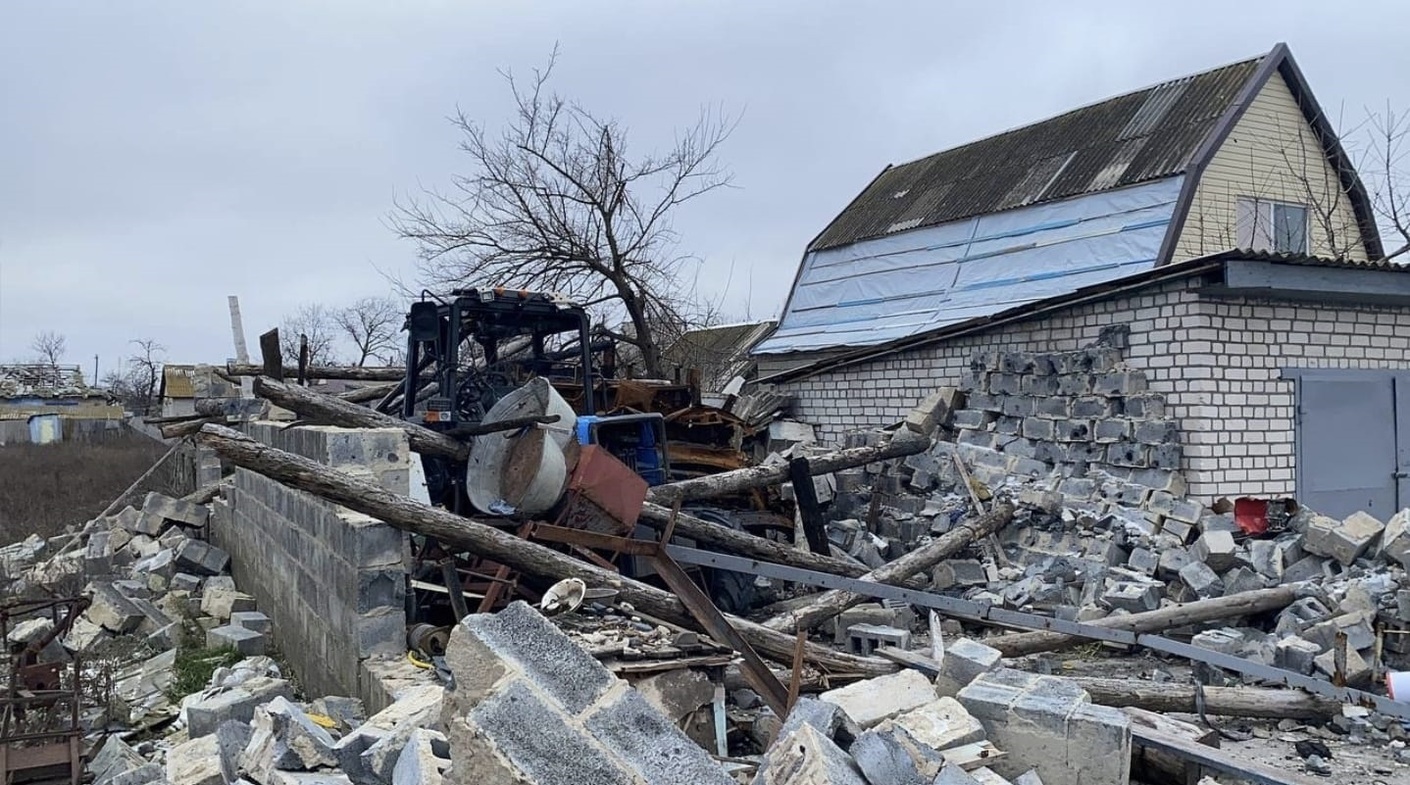“First aid” for local self-government in war conditions Interview of the head of the Askania-Nova Military Administration

Having been a long-time head of Kochubeivka, one of the most successful municipalities in the Kherson region, Ivan Dudar believes that the introduction of military administrations was a timely and correct step. After the victory, however, “everything should return to the way it was.”
Text by: Dmytro Syniak
Ivan Dudar was one of the first in the Kherson region to support the decentralisation reform in 2015. Led by him, the Kochubeivka municipality would go on to regularly appear in the news as a positive case to be followed by others. Residents of the municipality built an excellent primary healthcare system, repaired roads and introduced many interesting innovations. The war put an end to its development: on 11 March 2022, Russian occupation units entered the village.
“My wife and I were in a state of shock back then,” recalls Ivan Dudar. “Not realising yet how pointless our actions were, we began to barricade the front door of our house. I can’t explain now why we did it, since the Russians could get into the house anyway if they wanted. But we didn’t think about it then. Our house is on the outskirts of the village, so we suddenly decided that it would be safer to move to my parents. On the phone, friends advised us to leave Kochubeivka as soon as possible and flee, since Russians had already been seen in Zahradivka and Natalyno. When a shell hit very close by and the power went out, we realised that we had to do it immediately. I was wearing house slippers, and my wife and I did not take anything but documents, our cat and our dog. But we left — to the sounds of the battle, which was going on 4 km from Kochubeivka. Russian troops were already entering the village from the side of the field protection forest strip.”
Local residents have many vivid memories of the “liberators”
Fortunately, the occupation did not last long: already on March 28, under the pressure of the Armed Forces of Ukraine, the Russians retreated from the Kochubeivka municipality. Ivan Dudar, who at that time was no longer the village head of Kochubeivka, having lost to a competitor in the last elections, received an unexpected offer to head the Askania-Nova Village Military Administration. In this capacity, he gave an interview to Decentralization.

Ivan Dudar, Head of the Askania-Nova Military Administration, holding a fragment of a Russian shell. Early autumn 2022
Russian “gifts”
What damage did the Russian invasion cause to your native village of Kochubeivka?
Russian orcs left behind ruins of our school with a destroyed roof; our hospital and many private houses were damaged. Although to be honest, we consider ourselves lucky.
Because, for example, Russians all but razed the village of Potemkine in the Vysokopilllia municipality to the ground. Not a single house remained there, only ruins. The invaders also killed several Kochubeivka locals. They shot a man who was coming up from the basement with a bucket of potatoes in his hands. They shot at a car with a family of my fellow villagers that were trying to flee the war zone. The man died on the spot, the woman received a severe head injury, and only the child miraculously managed to escape. We also know about three cases of rape, and one of the victims was 83(!) years old. Another woman was pregnant at the time of the rape. There are simply no words... In fact, there were likely many more crimes against women, but few report such things. This is the “Ruskiy Mir” brought to us by the “liberators”.



Marks left by the “liberators” in the municipalities of the Beryslav district
Can you comment on your appointment as the head of the military administration? Did you agree right away?
I did, because I believe that by working in local self-government, I can bring the greatest benefit to my country in its time of need. In addition, I met the war unemployed, thinking about the direction in which to go forward. The Russian invasion, however, turned my life upside down. In March, I started volunteering in the team of the UA Will Win Charity Foundation together with Ihor Yosypenko, a regional deputy of the Kherson region from the Beryslav district. We brought humanitarian aid to various municipalities that had just been liberated from the enemy, went to the “grey zone” and organised handovers to the occupied villages of the Beryslav district and the city of Beryslav itself. This is how I worked until the regional leadership, in light of my managerial experience, offered me the position of the head of the military administration of occupied Askania-Nova.

One of the “Russian gifts”
Are you currently working in Kherson?
I’m probably in Kryvyi Rih more often, although I cannot call this city my permanent location. I also often come to the villages on the banks of the Dnipro, from where you can see the Left Bank. Life is completely different there now. Sometimes I and my colleagues come under fire. Very often we see the terrible consequences of these attacks. The Russians shell our villages, without aiming, blindly. A tank would come out, fire a few rounds and scuttle away. And a large-calibre tank shell pierces a house through to the other side.
And people still wouldn’t leave?
Indeed, most don’t want to leave their homes. Why? It’s hard for me to say. Probably, most often they are afraid that they will not survive elsewhere, will not be able to pay their expenses. So, until a shell or a missile hits a house, people stay. I’m running out of ways to say, “Leave, don’t wait for a ‘Russian gift’! At the very least, women and children should be away from the front line!” And the banks of the Dnipro in the Kherson region are now the front line. In one village, I saw a family living in a barn. Sure, everything is tidied, cleaned and whitewashed, and there is a furnace. But still, this used to be a barn. This family’s house and garage burned down from Russian shells, but they would not leave “their land” for anything. People also have vegetable gardens, chickens and so on here, so you will definitely not go hungry. Privately, I cannot accept this. How can you live in a barn? And yet, people do. The native land’s hold is strong... However, the attitude towards Russians among those who remain is different. In certain villages, some locals show enemies where to shoot with laser pointers across the Dnipro. I can’t wrap my head around it, but this is our new reality.

There is a widespread practice where employees of military administrations of occupied territories help their colleagues from municipalities liberated from the enemy. Ivan Dudar at a meeting with the residents of the village of Olhyne of the Vysokopillia municipality
Collaborators and occupation
Are there many collaborators among the people living in Askania-Nova?
There are quite a few because the local supporters of the “Ruskiy Mir” were joined by newcomers, those who escaped during the retreat of the Russian army from the Left Bank of the Kherson Region. Most of them expected to “wait it out” in Crimea, but the Russians don’t really let them there. That’s why they are stirring up trouble here. Nowadays it is very difficult to leave the occupied part of the Kherson region, in any direction... One of the leaders of the local collaborators is a former regional deputy from the Opposition Platform – For Life party (OPZZh). He goes around campaigning for the “new regime” and misleading the public. And in the absence of the Internet and Russian television, many people believe him.
Is this situation typical for the occupied south of the Kherson region?
In general, the closer to Crimea, the worse the situation. I am deeply disappointed in many former colleagues. An especially unfortunate case is the head of the Prysyva municipality of the Kherson region, Serhii Klishchevskyi, who immediately switched loyalties to the enemy. In addition to that, he then also threatened people who kept showing up to work in local schools and other institutions. Due to Klishchevskyi’s anti-Ukrainian position, the state was not even able to pay salaries to employees of certain state units of the Prysyva municipality. In other words, Klishchevskyi point blank refused to provide information regarding the outstanding salaries. Not only that, but the accountant of the Prysyva municipality, who had left for Kyiv, refused to share any accounting information with us, so intimidated was she by this head of the municipality. Although before, he always seemed to be a patriot of Ukraine, and his municipality was always one of the most successful. That’s how we missed it...
What is the sentiment among the population of the liberated part of the Kherson region now?
The Russian invasion showed who was who very clearly. While some were rescuing wounded Ukrainian soldiers and volunteering, others were handing over former ATO vets and public activists to the Russians and looting. We will still have to deal with these people. And there are many of them. I keep thinking about this one incident. In one municipality, to which my comrades and I brought humanitarian aid, a local deputy spoke before the people. He blamed the Ukrainian authorities for everything but did not say a word about the Russian invasion. I specifically asked him several questions, leading to the fact that the root of evil was Russia and not Ukraine. Nope! He stood his ground! Whether he is an enemy agent or just a local idiot, I don’t know. In the end, it is up to law enforcement to figure this out.
Can the head of the military administration detain such people and hand them over to the police?
No. But we can submit a claim, and they will later decide what to do about it. I sign such submissions from time to time regarding persons who collaborate with the enemy in the Askania-Nova municipality entrusted to me. Ukrainian law enforcement having all the information about the collaborators is already a lot.
What is the situation with the senior officials of Askania-Nova now?
Vadym Polishchuk, a lawyer who had won the last elections there, decided to stay in the occupation for family reasons. The secretary of the village council made the same decision. I am not blaming them because everyone has their own life and circumstances, and you cannot always compare them with yours. All people are different, and hardly any two situations are the same. Polishchuk’s deputy managed to leave for Poland via Crimea. He got a job there and is currently unable or unwilling to help me with Ascania-Nova affairs. Sometimes he just gives some tips over the phone. Although he still receives a salary, two-thirds of the wages he’s entitled to by law. Both he and I understand that this cannot last long. Although rather than dismissal, I am primarily advocating for the return of management personnel to work in their municipalities. This would significantly facilitate our joint work.
Do you cooperate with Polishchuk? Is he legally your subordinate?
No, this aspect has not yet been regulated by the legislation. Vadym Polishchuk is the current head of the Askania-Nova municipality, although without the powers that have been transferred to the military administration. Transferring these powers is the right step. I firmly believe that any work under the conditions of occupation is out of the question. This primarily applies to employees of all state structures. After all, the idea of exercising state powers in the occupied territory, with an occupation regime’s “Gauleiter”, is nonsense. Since last October, all flirtations with the occupiers in Askania-Nova had to be stopped.
Why October?
Because that was when the occupation troops appeared in the municipality. Until October, you can say that Askania-Nova was lucky. Since it is away from the most important roads, the Russians did not visit there much. They arrived, appointed a “Gauleiter” and disappeared for a long time. Because of this, local residents had the illusion of a “peaceful life” under occupation. They began to think that they would live as usual, only under the Russian flag. No one imagined looting, murders and robberies on their streets. But since October, all this came to pass: Russians, armed to the teeth, swarmed Askania-Nova and nearby villages, doing whatever they wanted. Under the guise of searching for “Ukrainian saboteurs”, they began to surround villages and turn everything upside down in people’s houses, interrogating and torturing the owners. That’s when most of the residents of Askania-Nova had their eyes opened to the truth. Any sympathies for the occupiers came to an end.
Are the hostilities felt in Askania-Nova?
Of course, because Russian troops are always accompanied by a “guard of honour” that is Ukrainian artillery fire. Two months ago, this artillery very successfully dealt with a concentration of invaders in Askania-Nova itself. After that, they try to disperse and hide in people’s houses. Naturally, no one likes this, but locals are not asked for permission.

“Lost” Russian tank in the Kherson region
What is the current situation with the world-famous Askania-Nova reserve?
“What good can Russia bring? There is a catastrophic lack of fodder, there is almost no medicine, and animals are afraid of constant explosions. The situation is very difficult!
What about businesses in Askania?
The Russians force all local entrepreneurs to register under Russian legislation. According to my information, only one person refused and closed his business. All others are working. I have mixed feelings about such work. On the one hand, I understand that you have to live somehow. Without cooperating with the occupiers, you can’t even sow your fields now. Moreover, in the occupied Oleksandrivka and Davydiv Brid, Russians demanded from the farmers, on top of Russian registration, 60% of the harvest as well. Otherwise, they did not allow to collect it. Many did not collect anyway because it was simply unprofitable. On the other hand, you can’t simply bow to someone who came to your house with weapons and took over. The time will come when we will have to have a discussion with the residents of the occupied territories, and they will have to talk to us. After all, the occupation leaves deep scars that will take time to heal.
“Military administrations do not pose any threat to local self-government”
What are the tasks you face as the head of the military administration?
Firstly, I have to protect the employees of the village council from kidnappings and intimidation efforts by the Russian invaders. I also facilitate the return of people to normal life, as far as possible under the current circumstances. My duties also include the implementation of measures of the legal regime of martial law, civil protection, public safety and public order, upholding the legitimate interests and freedoms of citizens, guaranteeing security, preventing a humanitarian disaster, etc. My administration controls the expenditure of budget funds. After all, we are talking about an occupied municipality to where Ukraine, in spite of everything, supplies certain resources. My task is to ensure that these resources do not reach the occupiers. For instance, the Askania-Nova Military Administration monitors payments to educators who work remotely from territory controlled by the Ukrainian government or from abroad. We are also drawing up a municipal recovery plan based on the needs we observe as well as on the understanding that after the de-occupation, the Russians will leave nothing behind but scorched earth. By the way, it will be then a duty of the military administration to arrange the evacuation of people who need it to a territory that is conditionally safer from shelling.
How relevant are the functions of the military administration? How are they better than the local councils of peacetime?
The difference between these two bodies is enormous. The road to democracy is usually quite long. And the head of the military administration, concentrating power in their hands, can very quickly carry out any order from above, from the military leadership. In wartime, efficiency is above all else. At the same time, it must be understood that with the beginning of a full-scale war, it was necessary to act immediately, certain mistakes were overlooked because the stake was too high. Now, however, these mistakes must be corrected and various issues must be slowly addressed. For example, the status of the head of the military administration. Is it a civil servant or an employee of local self-government?
A civil servant, apparently, because they are appointed by the President.
Yes, but at the same time, he has certain functions that are outside the purview of public administration. Do the local self-government laws apply to the head of the military administration? What are we empowered or not empowered to do? There are many such questions, and the state must answer them shortly. After all, the head of the military administration, in fact, single-handedly makes extremely important decisions and, therefore, assumes enormous responsibility. The peacetime head of a municipality does not have even a tenth of this responsibility, because most of the decisions are made collectively. In addition, the functions of the head of the municipality are regulated in detail by the laws of Ukraine and other documents. Frankly speaking, I feel very uncomfortable, say, making changes to the budget on my own. In peacetime, a special commission was created for this purpose, later the issues were discussed and put to vote by deputies. It was a big, complex and very democratic process. Since the head of the municipality made all decisions collectively, together with the deputies, they could always point out the deputies who did not vote or did not support the decision for one reason or another. Instead, the head of the military administration is alone responsible for everything.
The government sometimes has to hear accusations of oppressing local self-government through the creation of military administrations. How fair do you think these accusations are?
I see no better way to organise remote control of the frontline and occupied territories than through the creation of military administrations. On the other hand, what kind of oppression are we talking about when nine times out of ten, the heads of military administrations are former heads of municipalities, that is, people who have the most trust on the ground? This was done in most municipalities such as Beryslav, Kochubeivka, Vysokopillia, Oleksandrivka, Novoraisk, etc. Of course, one can debate the necessity of creating military administrations in certain municipalities. For example, in the very Kochubeiv municipality, which was under the Russians for only two weeks. “Peacetime” local self-government could have kept operating there. But this question should be answered primarily by the military. If they need it, so be it.
In any case, the introduction of military administrations is a temporary measure, isn’t it?
The main task of our people at the moment is to preserve our state. Here, military administrations act as a sort of crisis framework for the state authority. Their quick implementation definitely helped to hold many territories. Now the military administrations very quickly solve various issues, from clearing landmines in the area, supplying gas, light, water and heat to certain matters that I cannot talk about as it would be a violation of military secrecy. Military administrations act much faster than ordinary local councils, able to make decisions on the recovery of infrastructure destroyed by shelling and help in the recovery of private estates. It is much easier for them to find — in coordination with the regional military administrations — Starlinks, the only source of the Internet in the front-line territories. Military administrations are a kind of “first aid” for local self-government in war conditions. The time will come when they will become unnecessary. At the moment, however, they are part of the Ukrainian defence effort.
Tags:
war stories report war stories special project
Область:
Херсонська областьSource:
Пресцентр ініціативи "Децентралізація"
22 January 2026
Громади отримають черговий пакет фінансування на 119 проєктів відновлення за підтримки ЄІБ
Громади отримають черговий пакет фінансування...
Громади отримають 740,3 млн грн, для реалізації 119 проєктів відновлення у громадах, за підтримки Європейського...
22 January 2026
Стартував відбір громад до другої черги проєкту «Рух без бар’єрів»
Стартував відбір громад до другої черги проєкту...
Міністерство розвитку громад та територій України розпочинає прийом пропозицій від громад для участі другій черзі...
22 January 2026
«У кожній хаті свій КРЕДЕНС»: як громади об’єднуються навколо цифрової спадщини
«У кожній хаті свій КРЕДЕНС»: як громади...
Протягом 2025 року три громади-партнерки – Горохівська та Рожищенська громади Волинської області, а також...
21 January 2026
UAH 32 million from community budget – for defence innovations: Experience of Khmelnytskyi
UAH 32 million from community budget – for...
Local self-government during wartime involves more than just maintaining stability at the rear; it also contributes...